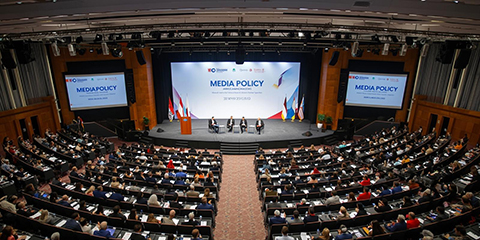IRADA advocates for comprehensive legal rights for digital media employees
JournalismPakistan.com | Published last year | JP Staff Report
Join our WhatsApp channel
ISLAMABAD—Technology has transformed the media landscape from traditional print to broadcast and digital media; however, more than 250,000 digital media workers, including over 20,000 journalists, lack legal protection for their rights in this changing media sector. The situation requires introduction of a comprehensive legislative framework to provide legal cover to the rights of media workers and journalists, employed in this digitalized media market. This demand is articulated in a legal brief developed by the Institute for Research, Advocacy and Development (IRADA) with the technical input from international legal and labor law experts.
While explaining salient features of the brief, Muhammad Aftab Alam, Executive Director of IRADA, stated that there is an urgent need for a comprehensive legal framework to protect media workers across all platforms in Pakistan. He mentioned that the existing special law i.e., The Newspapers Employees (Conditions of Service) Act of 1973 recognizes only those workers who work for the newspapers. Unfortunately, due to technological advancements, print media is shrinking. However, a vast majority of workers, associated with broadcast or digital media, do not have such special protections as available to print media workers in the country.
Mr. Alam stated that the brief reveals alarming statistics regarding unresolved cases within the current labor dispute resolution system, emphasizing that many media workers still await enforcement of wage awards. The legal uncertainties faced by journalists compromise their ability to perform their duties effectively and safely. He further said that the brief advocates for statutory employment terms for media workers, uniform service structure, whistle blowers' protection, data protection rights for digital media workers, wage board for all media types, review of wage determination formulas, establishment of Independent Tribunal for Media Workers, judicial supervision of the Tribunal, effective inspectorate for compliance and a right to appeal for aggrieved workers.
Mr. Alam added that, in the absence of a legal framework, most of the workers in the broadcast and digital media sector do not have any legally enforceable contractual arrangements with their employees. This situation is particularly troubling for women workers who are also facing hardships in terms of unequal pay and unfriendly work environment.
This legal brief will be submitted before the Islamabad High Court in a case (Anthony Bellanger, International Federation of Journalists (IFJ) vs Secretary, Ministry of Information and Broadcasting etc.,). The case was initiated by the Islamabad High Court in 2021 through converting a letter of the Secretary General of the International Federation of Journalists (IFJ) into a petition. IFJ wrote that letter as a follow up of a groundbreaking report titled 'LABOR LAW REFORM FOR PAKISTANI JOURNALISTS AND OTHER MEDIA WORKERS' produced by IRADA and IFJ in 2021.
Mr. Alam hoped that the Court would recognize the urgency of the situation and direct the government to take immediate steps for the reforms in the legal framework. He asserted, "the court must instruct the government to engage with all stakeholders, particularly representatives of media workers and media unions, to ensure that comprehensive legal reforms are introduced and implemented in a holistic manner."

























